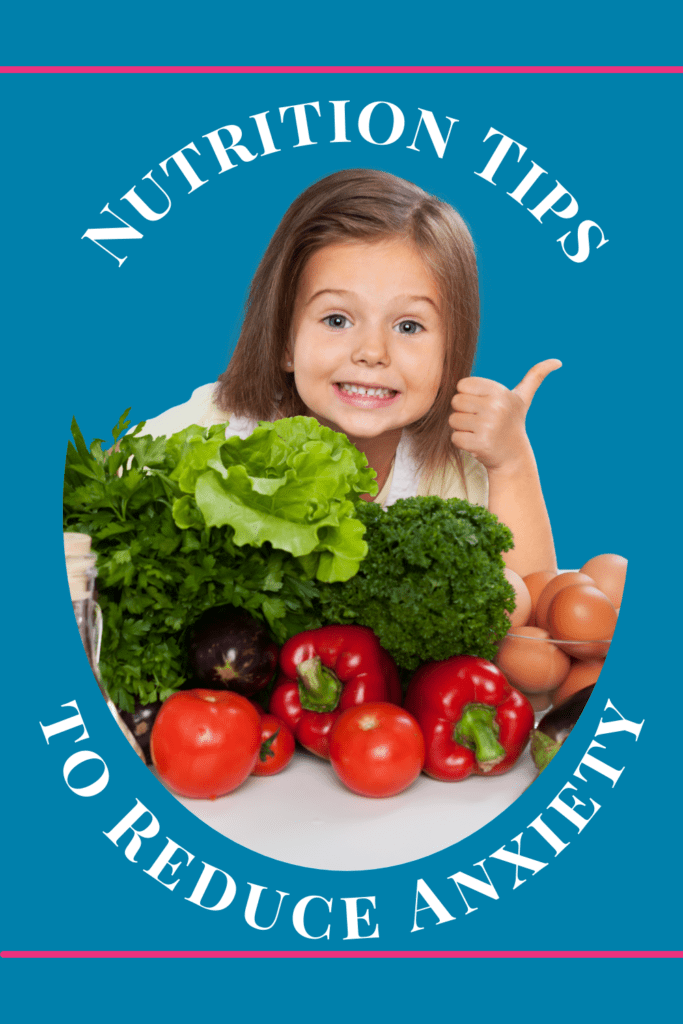Gillian was worried sick about her 10-year-old daughter who had terrible anxiety, and nothing was working. “I have literally tried everything!” she told me when we met a networking event.
The thing is that, Gillian thought she had tried everything. She did what all good moms do when their child has anxiety. She took her daughter to the doctor, a therapist and even enrolled her in meditation and yoga classes.
These are all very good things – but there’s a central piece missing that many people overlook because we have this very core but faulty belief that anxiety is all in our head.
Anxiety is Not Just in the Head
Stress hormones, the nervous system, neurotransmitters and our gut bacteria are all very bio-chemical processes and they have a profound effect on our brain-chemistry. As someone who lived with debilitating anxiety for the first 29 years of life and thought I had tried everything – I was shocked at the impact of nutrition on brain chemistry.
An imbalance in our body’s biochemistry can create anxiety and anxiety can in turn further exasperate the anxiety since our body uses so many nutrients to manage the anxiety mechanisms in our body like fight-or-flight.
I know that kids and moms’ anxiety is at an all-time high right now. I know mine certainly is! Last time, I talked about the impact of anxiety, stress and even trauma on learning ability.
The best way to protect your child against the effects of stress and its impact on their learning ability to is to ‘pad’ their nervous system. Do all the good stuff like stress reduction, plenty of sleep and exercise and also – nourish, nourish, nourish!
There are specific nutrients that are crucial for good brain-chemistry and reducing anxiety. Of course, a diet rich in various nutrients is key, but below I share my top anti-anxiety go to nutrition tips.
1) Balance Blood-Sugar
Good nutrition has an incredible impact on ‘padding’ the nervous system during times of stress. The body utilizes so many more nutrients to manufacture stress hormones, neurotransmitters and so much more in order to try and bring the body back into balance.
The liver gets taxed with trying to detox those excess stress hormones and even our digestion shuts down. Even if we are able to eat, there is often poor absorption of nutrients that we so desperately need to cope.
So begin with balancing blood sugar levels. Blood sugar levels already get thrown off with stress and when they are imbalanced, then anxiety increases. Eating plenty of protein and healthy fats with each meal and moderate amounts of carbs is crucial.
2) Support the Adrenal Glands
The adrenal glands take a huge hit when your child is chronically stressed. I learned that several years ago when I had a nervous breakdown.
What can you do to help support the adrenal glands?
- Electrolytes are quickly used by the body and are critical to help manage the stress response. Buy some pre-made electrolytes from a health food store or mix lemon juice/apple cider vinegar with a pinch of sea salt. Avoid sugar filled drinks like Gatorade which will throw off blood sugar levels and are full of irritating food colouring.
- Vitamin C has so many functions and it is used up quickly during stress since it helps the liver to detox stress hormones. We certainly don’t want those accumulating in your child’s body. Supplement if necessary.
- Other tips to support the adrenals is ensuring your child is getting as much rest as possible. During times of stress your child needs more sleep – and yet so often stress results in less sleep.
3) Neurotransmitters – The Brain’s Happy Chemicals
Speaking of sleep, GABA is one of my all time favourite amino acid supplements to help kids with both mental and physical anxiety. It is known to have a calming effect on the nervous system. I have used it, as has my daughter and my clients for both anxiety during the day as well as promoting more restful sleep.
When GABA is low it can lead to anxiety, panic attacks, insomnia, hyperactivity and even mania. GABA is created when we eat foods like meat, chicken, eggs and dairy and it can also be created when we eat ferments with the bacteria Lactobacillus Rhamnosus.
GABA usually has a positive effect for anxious or hyperactive children when taken in low doses to start. Consult your natural health care practitioner to see if it is right for your child.
4) Magnesium
Magnesium isn’t called ‘nature’s relaxation mineral’ for nothing. Many of us are magnesium deficient – including our children. Magnesium is quickly used up during times of stress.
Research found that magnesium helps the brain to better function and reduces stress and anxiety. It acts directly on the nervous system by assisting the body to shift back into ‘rest and digest’ instead of ‘fight-or-flight’. It also helps to regulate the sleep hormone melatonin and sleep is so critical to nervous system repair during times of stress.
5) Zinc for Anxiety, Thinking & Immunity
Zinc is often known as the immunity mineral but it is also necessary for manufacturing neurotransmitters like serotonin and dopamine. When you consider how stress depletes zinc then you can see why stress also brings down our immunity.
Zinc is also important for adrenal support. Studies found that those with low zinc also had low adrenal function.
6) B Vitamins
B vitamins are arguable one of the most critical nutrients for managing stress and anxiety. Several of the B’s are necessary for the production of neurotransmitters like serotonin and dopamine. One of B vitamins that can be a game-changer for so many people when combined with zinc is B6.
7) Vitamin D
The sunshine nutrient is known to increase our resilience to stress. War vets with PTSD compared to vets without PTSD were found to have significantly lower levels of this vitamin. Ensure your child is getting lots of sunshine and supplement. This is one nutrient that everyone should be supplementing because we simply do not spend enough time outside.
8) Liver Detox
If your child is showing signs of irritability or aggression, this could be due to liver congestion from excess stress hormones. Gently support detoxing their liver with lemon water, bitters and cruciferous vegetables like cabbage, broccoli and artichoke.
9) Keep the Nervous System Calm
Other non-food related supports for the nervous system are guided visualizations, left nostril breathing, Epsom salt baths, art therapy as well as EDMR.
Remember that you can’t out-supplement a bad diet. If your child is a fussy eater, then start slowly adding in nourishing foods to foods they already love. This is one of the many tricks I teach in my program The Full Potential Formula.
Want to learn more about how you can help to reduce your child’s anxiety by addressing what I call the 3 pillars of brain health? Book a free discovery call to learn more.


